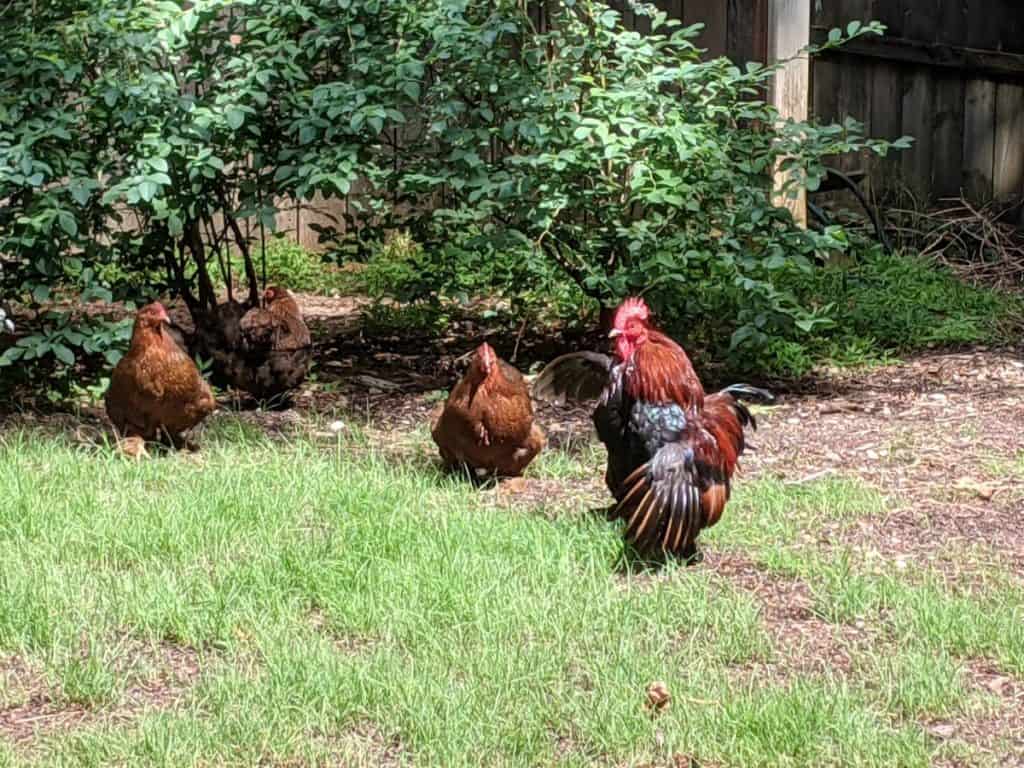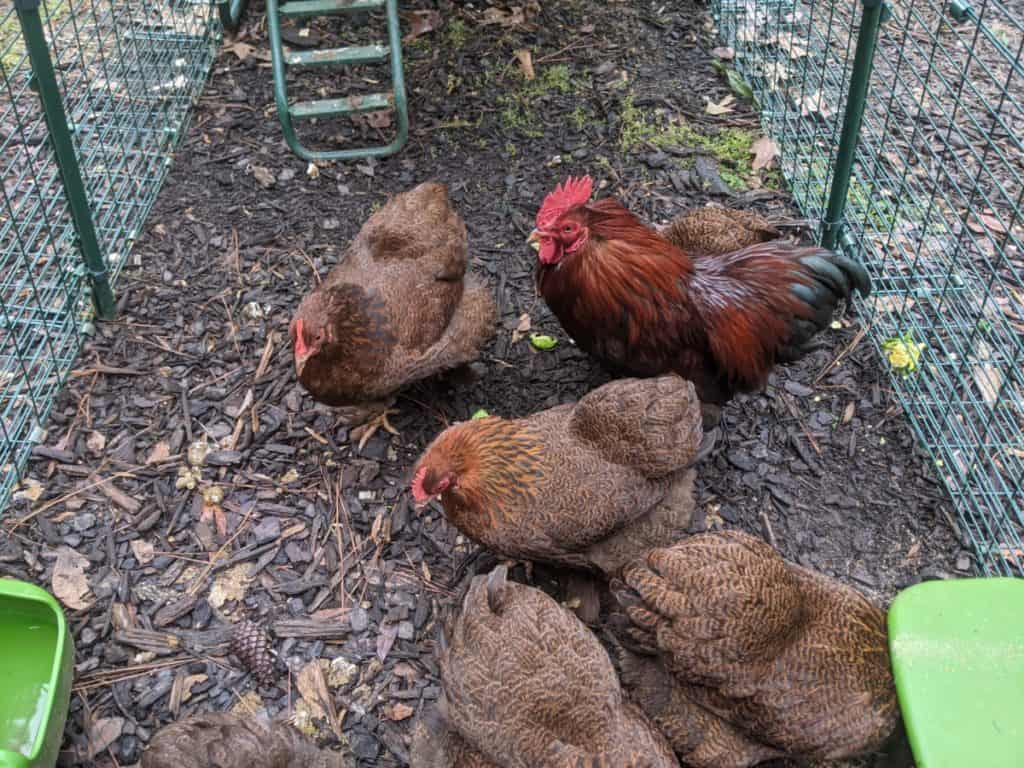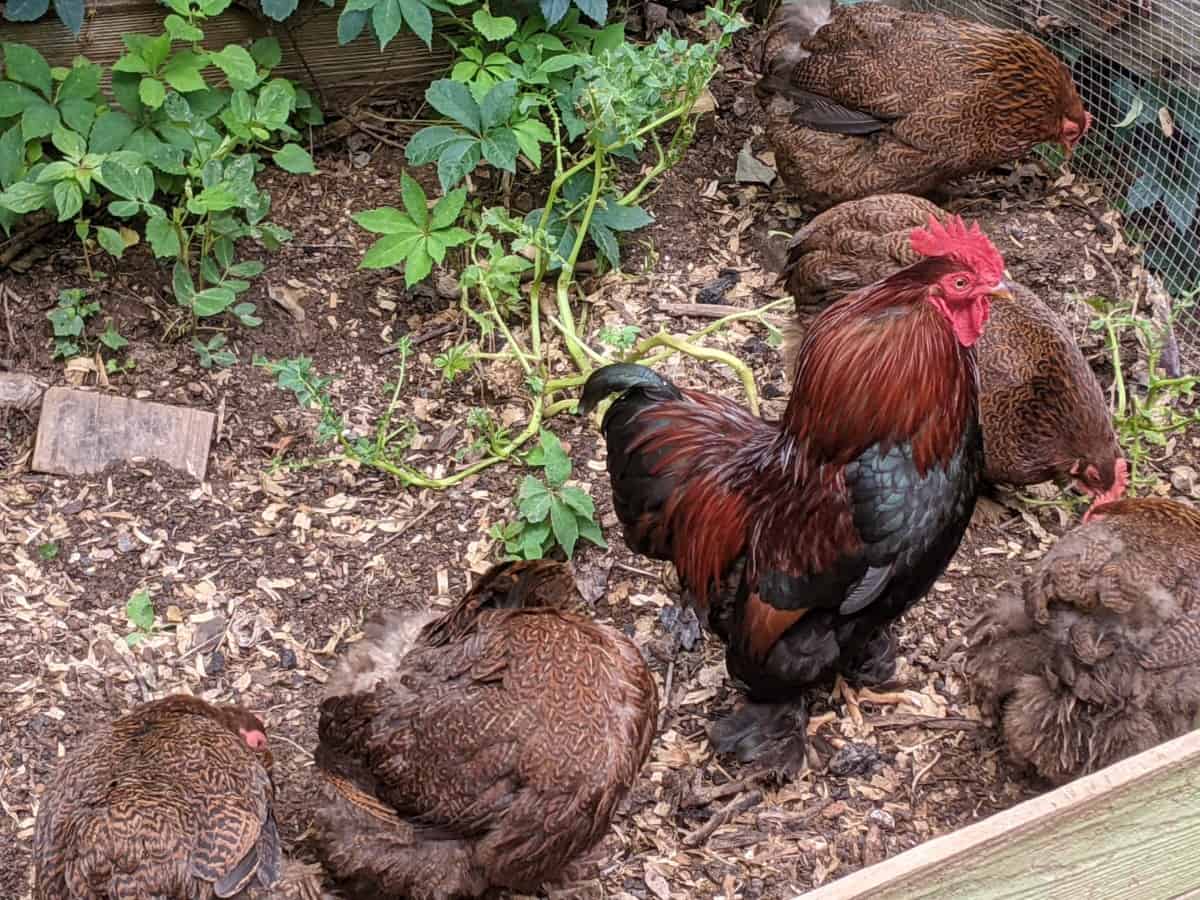We all need a balanced diet to meet our vitamin requirements, and chickens are no exception. Vitamins are essential to keep chickens healthy and to allow them to grow and function optimally. Sometimes chickens can become deficient in specific vitamins.
The most common deficiencies in backyard chickens are Vitamins B1, B2, B3, B5, B6, B7, B9, and B12. Other vitamins that can be in short supply are Vitamin A, D3, E, and K. Serious health complications arise from a shortage of these vitamins. A balanced feed is important to correct deficiencies.
Vitamin deficiencies in backyard chickens occur because the vitamin is inadvertently omitted from the feed. If the chicken feed is stored for more than three months, the vitamins in the chicken feed may degrade.
It is helpful to know what common vitamin deficiencies might be seen in backyard chickens and their symptoms.

Fat-Soluble Vitamins.
Fat-soluble vitamins are stored in the fat. Depletion of fat-soluble vitamins takes longer to present symptoms. It may also take longer to build up adequate stores after a deficiency.
Vitamin A Deficiency In Chickens.
Vitamin A is crucial for mucous membrane health. The symptoms of Vitamin A deficiency in adult chickens are:
- Emaciation and weakness
- Discharge from the eyes progresses from watery to milky white to thick cheesy pus, which may obliterate the eye.
- Necrotic secretions from the nasopharynx and mouth
- Decreased egg production and chick death in the shells.
The symptoms in young chicks are:
- Inappetence
- Sleepiness and weakness.
- Retarded growth.
- Ruffled feathers
- Incoordination
Food naturally rich in vitamin A is pumpkin, cantaloupe, spinach, kale, dandelion, broccoli, sweet potato, and peas.
Vitamin D Deficiency In Chickens.
Vitamin D is also a fat-soluble vitamin. It is responsible for the development of healthy bones as calcium cannot be absorbed without the presence of Vitamin D3. Chicks often have rickets, weak, soft beaks, and deformed toenails.
Adult chickens that are Vitamin D deficient develop osteoporosis and may begin limping. Natural sources of Vitamin D3 are mushrooms, eggs, and fish.
Vitamin E Deficiency Causes Crazy Chick Disease.
Vitamin E must be accompanied by selenium for it to be absorbed by the body. In chicks, Vitamin E deficient feed results in degeneration of the muscles. There is also softening of the brain called encephalomalacia and is known colloquially as crazy chick disease.
The symptoms include muscle tremors, incoordination, ataxic gait, leg spasms, paralysis, and kidney failure. Wryneck, which is a twisted neck in chicks, can be caused by Vitamin E deficiency. In adults, the deficiency also shows muscular weakness and neurological symptoms.
Natural sources of Vitamin E are broccoli, spinach, turnips, pumpkin, asparagus, beet greens, collard, and dandelions.
Vitamin K Deficiency Causes Bleeding In Chickens.
Vitamin K is responsible for blood clotting. Without it, the slightest bump could result in fatal bleeding both internally and externally. The skin of chickens with insufficient Vitamin K is bruised and discolored.
The bruising creates painful swollen areas, which result in the chicken not wanting to eat or interact with the other chickens. They may avoid contact with the flock and generally look miserable.
Herbs such as basil, thyme, and sage are rich in Vitamin K. Dark green leafy vegetables are a good source of Vitamin K.
Water-Soluble Vitamins.
Water-soluble vitamins are easily and quickly flushed from the body. Deficiencies in any of the water-based vitamins will rapidly result in symptoms.
| Vitamin | Symptoms of deficiency | Natural Sources |
| Thiamine (B1) | Lethargy, head tremors, decreased appetite, neuromuscular problems, digestion issues, low body temperature, and respiratory rate. | Peas, beans, lentils, sunflower seeds, dairy products. |
| Riboflavin (B2) | Curled Toe Paralysis and hock walking in chicks. They are lethargic. Decreased egg production and low numbers of hatched live chicks. Changes in the egg albumen color. | Eggs, asparagus, spinach, beet greens, soybeans. |
| Niacin (B3) | Diarrhea, poor appetite, growth retardation. Chicks at two weeks often develop ‘black tongue,’ which is swelling of the mouthparts. Dermatitis and bowed legs. Tendon injuries are common in adults. | Peas, peanuts, sunflower seeds, mushrooms. |
| Pantothenic Acid (B5) | General metabolic disturbances. Bleeding, swelling, retarded growth, dermatitis, and neurological symptoms. | Fish, grains, eggs, and legumes. |
| Pyridoxine (B6) | Retarded growth, anemia, and dermatitis. Seizures or fits may be seen in chicks. Involution of the wattles and combs are seen in adults. | Sunflower seeds, spinach, bell peppers, peas, bananas. |
| Biotin (B7) | Dermatitis on non-feathered areas. Fatty liver and kidney syndrome. Skeletal deformities in chicks. | Peas, strawberries, raspberries, oats, soybeans, spinach, cauliflower, peanuts, broccoli. |
| Folate/ Folic acid (B9) | Pale head parts, anemia, neck paralysis, poor feather growth and color, and decreased egg production. | Dark, leafy greens, strawberries, raspberries, asparagus, peanuts, corn, carrots, flax seeds, beets. |
| Cyanocobalamin (B12) | Emaciation, poor feather quality, and nervous disorders. Bleeding, anemia, and embryo deaths. | Dairy products, fish, eggs, kelp, meat. |
Do Chicks Require Vitamins?
It is essential for chicks to receive sufficient vitamins for normal growth, feathering, and development. Deficiencies in even one of the vitamins can cause long-lasting and possibly fatal results.
They can obtain their vitamins from a well-balanced chick feed ration or mixed vegetables and homemade rations. Free-range chicks will have the advantage of increased exposure to different food sources and, therefore, a wide range of vitamins.

Can You Overdose A Chicken On Vitamins?
Water-soluble vitamins would be excreted out of the chicken’s body with no ill effects if there was a surplus. Fat-soluble vitamins are stored in the chicken’s body fat. Excess amounts of fat-soluble vitamins can be harmful and toxic.
Supplying natural food items or balanced rations will not result in an overdose of vitamins. The problem arises when zealous owners buy artificial vitamin supplements to add to water or feed.
Conclusion.
Several vitamins can be deficient in backyard chickens. It is important to correct these deficiencies to ensure healthy, productive birds. The best option is to provide balanced feed rations either from commercial products or well-thought-out homemade rations. It is preferable to avoid adding concentrated fat-soluble vitamin supplements. ‘
These could build up in the chicken’s body and cause toxicity. Remember it will take some time to see the effects of dietary changes, so make changes slowly and give the vitamins time to improve the chickens’ health.
References
Leeson, S. 2015. Vitamin Deficiencies in Poultry. https://www.msdvetmanual.com/poultry/nutrition-and-management-poultry/vitamin-deficiencies-in-poultry
UK College of Agriculture, Food and Environment. Common nutrition-related problems of poultry. https://afs.ca.uky.edu/poultry/common-nutrition-related-problems-poultry

